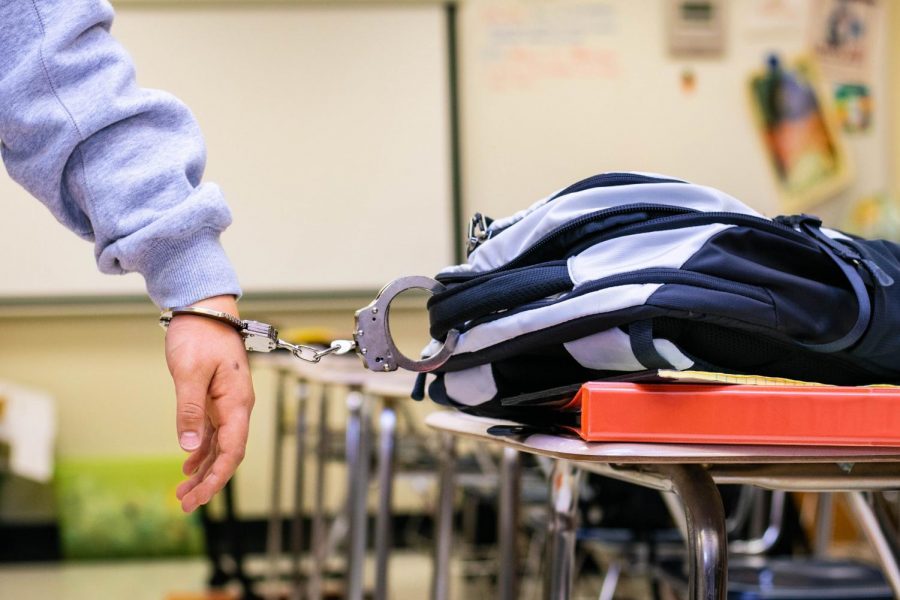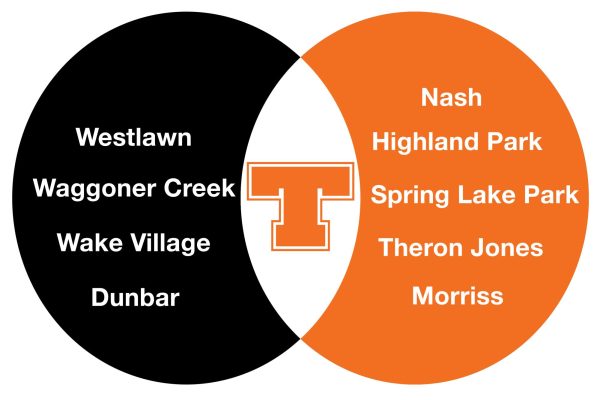The holiday break burden
Why homework has no place when school is out of session
Photo Illustration. A student is handcuffed to their backpack symbolizing the restraint of homework over school breaks.
November 28, 2019
While the last teacher is home and ready to enjoy the holidays, the farthest thing from a student’s mind is the school they just left, but they are still trapped. Many students see the homework they are assigned over school breaks as a reminder that even when they are off campus and in the comfort of their homes, they are never free from the shackles of our school system.
Teachers’ intentions are noble, and their logic is understandable: if students are given extended periods of free time, it should be used productively. This is a fair stance, but quickly delving into research and reasoning regarding the topic provides a simple answer: teachers are thinking about it all wrong.
To start, homework assigned over break shouldn’t be considered normal homework. It’s not, and the benefits of each are wildly different. It’s insensible to argue against regular homework. The benefits of less than 90 minutes of homework a night are proven by professional research. According to New York University and Duke University, this stable, reasonable amount of work encourages independence and cognition.
But that is only half the issue. A separate, equally reputable set of studies draws a fine line between what is categorized as beneficial homework and what is not. One can look at what distinguishes normal homework from what is assigned over break, and it’s clear homework over seasonal breaks falls into the second category, with its own set of disadvantages and negative side effects. This type of schoolwork actually impedes learning. The work assigned over break rarely leads to learning, only to stress and time wasted.
This is especially true when considering how normal homework and the kind assigned over break are inherently different. The average day to day assignments are directly based off of what students learned in class a few hours ago and carries the assumption that students will have the opportunity for help when they return the next day. Homework assigned over break fails to offer an outlet for assistance when they don’t fully comprehend the material; they don’t have the chance to easily see their teacher the next day. This leaves those who have trouble comprehending certain material feeling helpless when they should be enjoying their break.
Often times, what is assigned itself is completely different because it is intended to be completed over a holiday. The most outstanding example is what is known as “busy work.” When assignments are excessively long or even themed around the holidays, it is no secret they will likely not lead to learning. Some will question if the work is even intended to be effective or it is known by teachers that this work yields little learning for the hours spent.
There is a popular theory that a lot of what is assigned is done out of animosity by teachers who feel that if they have to grade papers over the break, students deserve some work, too. Whether this is or not, it isn’t enough to justify homework over break.
From this so far, we’ve established that the work assigned over break rarely leads to learning, only to stress and time wasted.
Also, when students are on break, they travel, experience and bond with their families, so the homework that beckons students away from these opportunities to their secluded desk, are difficult to justify. The stress of these assignments or the hours they take to complete isn’t an opportunity for student growth; to the contrary, it is a hindrance.
Left to their natural devices, students would learn just as much, likely more. With easy access to educational games, informative shows and social circles, living in the 21st century is an educational experience in itself. If there was an abundance of free time during a break, like there should be, there would be a greater opportunity to take advantage of this, to visit shows or museums and engage with their families — not their textbooks.
However, not all work over break is doomed to be ineffective. The kind of work that is suggested for extended periods of time, casually reading out of interest, is linked to higher achievement. This is one of the few types of work that can coexist with a productive break, not detract from it. In a 2006 ThoughtCo study, reading Harry Potter was linked to higher achievement than other forms of homework. When stories concerning mythical beings and magic powers can teach students more, it’s clear there is no need for structured worksheets to learn.
What’s more frightening than the evidence suggesting this homework isn’t effective, is the argument concerning the stress it causes for teens. With constant assignments looming over them, students rarely feel they are free to enjoy their break. The book bag students wish to forget, once they are released from the confines of the American school system, keeps them unable to escape the stress of school. Whether relaxing on a beach in Florida or surrounding the Christmas tree with family, the fact buzzing in the back of students’ minds is that it will be over soon as they return to their monotonous school routines. The impending cloud of homework only reminds them of this more.
Teachers should recognize and respond to arguments against homework over break. On a closer level, Texas High teachers and all alike should examine what they are sending home with their students and look closely to see if what they are sending is beneficial. Because as proven, it usually isn’t.
All disgruntled adolescents sent home on a holiday with a fresh packet of questions or demands for book reports would like to see their instructors question their traditional practices and judge for themselves if a time of supposed freedom deserves to be squashed by a textbook.




















